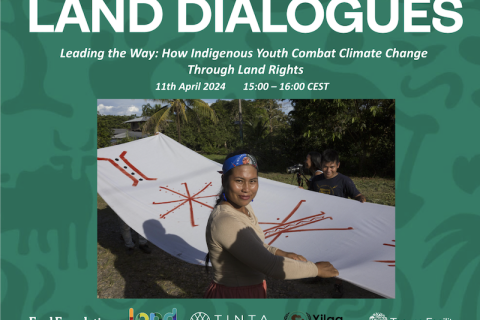Under the umbrella of the Land Dialogues series, the first webinar of this year’s series “Leading the Way : How Indigenous Youth Combat Climate Change Through Land Rights” took place on April 11th, 2024. The webinar drew in a little over 200 participants and featured young Indigenous and local community leaders from around the world. The series is organized by a consortium of organizations, including the Land Portal Foundation, the Ford Foundation and the Tenure Facility and this particular webinar was organized by organization YILAA and TINTA.
Lina Salas, activist and impact distribution strategist at If Not Us Then Who, moderated the panel, which featured the following speakers:
- Venedio Osing, BPAN Homecoming Movement
- Carloz Lozano, FEPIKECHA
- Aicha Salihou, YLMPA
- Rosmery Marbella Recinos Chay, ACOFOP
Please see a brief recap of the full captivating conversation.
Based on your experience, what are the challenges that Indigenous and local community youth face within your community, in preserving their cultural heritage within a rapidly changing world, considering climate change and urbanization?
Carlos Lozano: We have been suffering violent deculturalization in Peru, for example, we have received migrants and we were forced to leave our ancestral practices, our traditions and our way of living. We have lost our culture - that is why part of our focus is in activism, in order to create these kinds of spaces which are educational spaces meant to share our ancestral knowledge. We feel that our way of living is sustainable. For example, we use wood, straw and sand in the traditional ways of building homes and these are recyclable. In our community, we are taking action in order to recover the ancestral knowledge on how to build houses.
With your leadership in climate activism, what would you like to see happen moving forward in order to build climate resilience for you and future generations?
Aicha Salihou: Youth are trying to advocate for land rights. What I suggest is that impementing organizations involve youth in financial and grant-making decisions. It is also important that knowledge around climate change and restoration be taught in schools at the educational level. Finally, we must also be sure to pay attention to young women, girls and those with disabilities when we think about moving forward.
What got you into this kind of work? What keeps you there? Can you give us a story from your community that has inspired you to keep going?
Venedio Osing: It is based on the concern about our customary lands. We are losing the people who have the knowledge - our traditional knowledge. Indigenous Peoples are marginalized and are seen as different. This is why I am still working in this movement. I want Indigenous Peoples to have sovereignty, so that they can do what they want, according to their traditions.
Rosmery Marbella Recinos Chay: What drives me to continue is seeing the forests that were here before and now in comparison, everything is empty. In Guatemala, we have the reserve, and I want to fight for us to be able to continue breathing this air and to serve this area.


